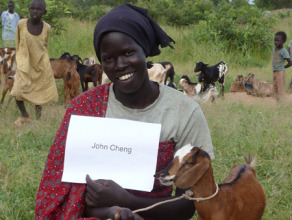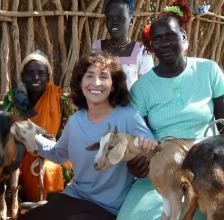We have all heard of the tragedy happening in the Darfur region. An independent sultanate for several hundred years, it was incorporated into Sudan by Anglo-Egyptian forces in 1916. The region is divided into three federal states: Northern Sudan is mainly Arab Muslim, Western Sudan (Darfur) is mainly African Muslim and Southern Sudan is mainly Christian and Traditionalist. Two wars between the North and South have been fought since Britain gave independence to Sudan and Darfur has been in a state of humanitarian emergency since 2003. An estimated 4 million people have been killed since 1956. and over 2.8 million people have been displaced and many of these refugees have gone into camps where emergency aid has created conditions that, although extremely basic, are better than in the villages, which offer no protection against the various militias that operate in the region.
Today, the conflict still isn’t completely solved, though both parts are trying to work on a Peace Agreement. Over 200,000 people were taken to the North as slaves during the war. As these people return to the South, many by Arab “slave retrievers,” they have no means of support.
This is where Goats for the Old Goat intervenes. The charity provides goats for the freed slaves who are coming back to their homes but own literally nothing, and helps support those who have been affected by polio, and post-traumatic stress disorder, or PTSD, related to recent wars.

A she-goat can provide up to one liter of milk (0.26 gallons) which means the difference between nourishment and starvation. Goat milk provides high quality protein, a lot of calcium and fat which are all very important for the body’s energy production. The excess milk can be used to make cheese and sold at the market. Neighbors can work together to start small local dairies. Goat milk doesn’t need to be homogenized, it makes it simple to begin production for sale. Goats can graze easily on the grasses of Southern Sudan. The she-goats have kids that will increase the families’ incomes: they are used for food and their dung is used as fertilizer. One goat opens a world of survival, and allows a family to have the safety net to pursue education and micro-business.
Why ‘Goat For The Old Goat’?” One morning I woke up and thought I am turning 60! That was about a year and a half ago and I thought, ‘Well, I am an ‘old goat’’ and since I can’t turn back the speedometer it made sense that this ‘old goat’ should try and give some real goats to people who have nothing and eat every other day,” says Ellen Ratner, founder of the charity. Because of her work in Southern Sudan, Ratner wanted her friends and others to contribute money for goats, so that people would be able eat and children would not have a lifetime legacy of malnutrition. Ellen Ratner is the White House Correspondent and Bureau Chief for The Talk Radio News Service, covering the White House and providing exclusive reports to talk radio stations from the Congress and government agencies. In addition, she is a credentialed reporter at the United Nations in New York where Talk Radio News Service has a bureau.

If you were looking for an original and meaningful gift, consider donating a goat! One goat is worth $60 and if you can’t afford that much, you can buy a “partial goat”, starting at $10 and up to $40. You can also donate for a full or partial tricycle wheelchair or a “Sack of Hope” that include a tarpaulin, a blanket, a mosquito net, a cooking, a plastic canister, a hand-held sickle; and fishing hooks. Sold on the website are also T-shirts, beach tote bags, party packages, and hand-made jewels and ebony and mahogany crosses.
One truly great aspect of these donations is that you will receive a picture of the person you’ve helped and the goat you have donated. This will give you this amazing feeling of making a difference and actually helping someone in the world.
So stop racking your brains for an original gift, and buy a goat!
Click here to donate: Goats For The Old Goat.
For the Best that Pet Lifestyle and Animal Welfare has to offer follow Wendy Diamond on Facebook, Twitter, and right here at AnimalFair.com!
